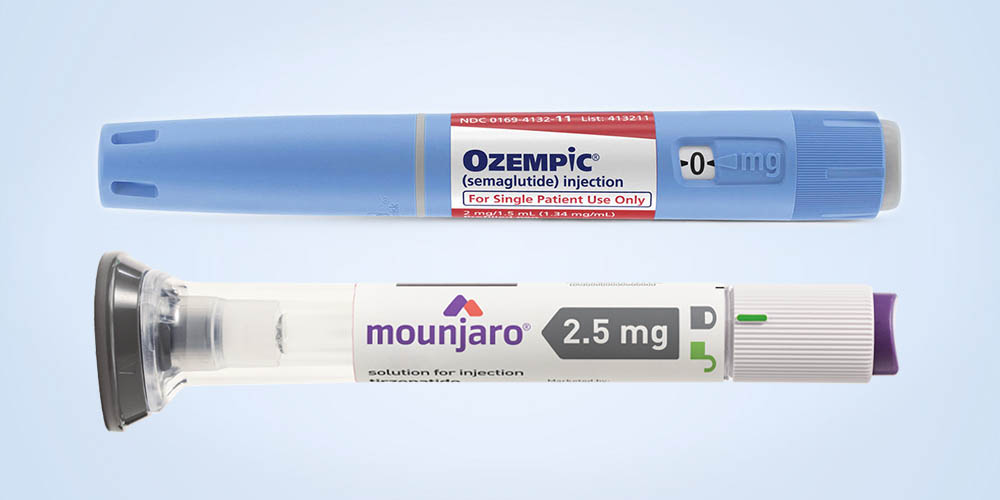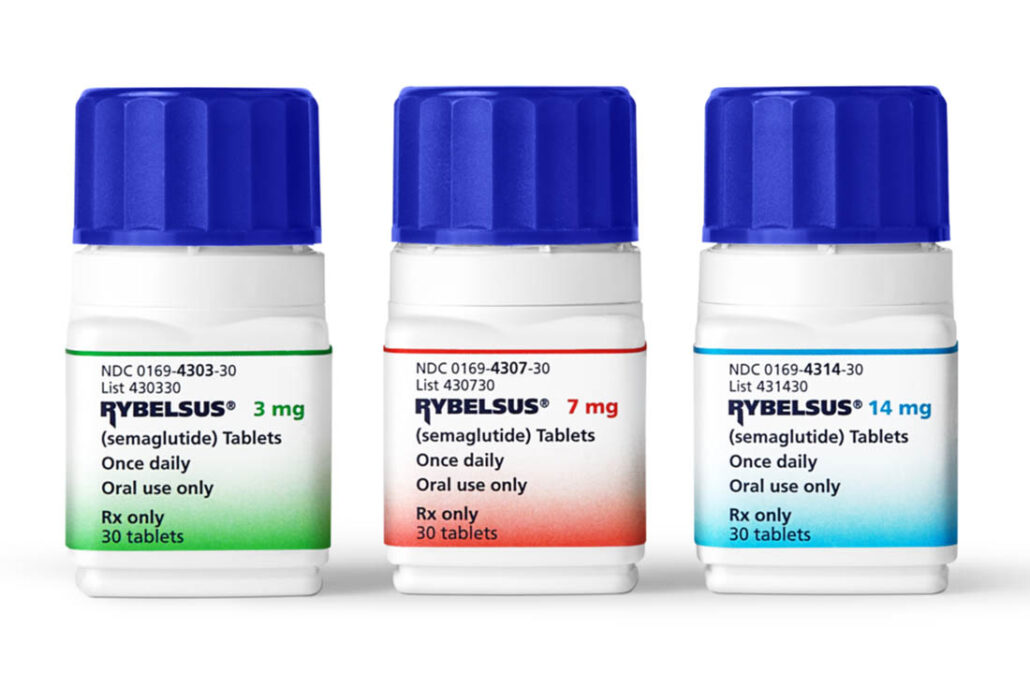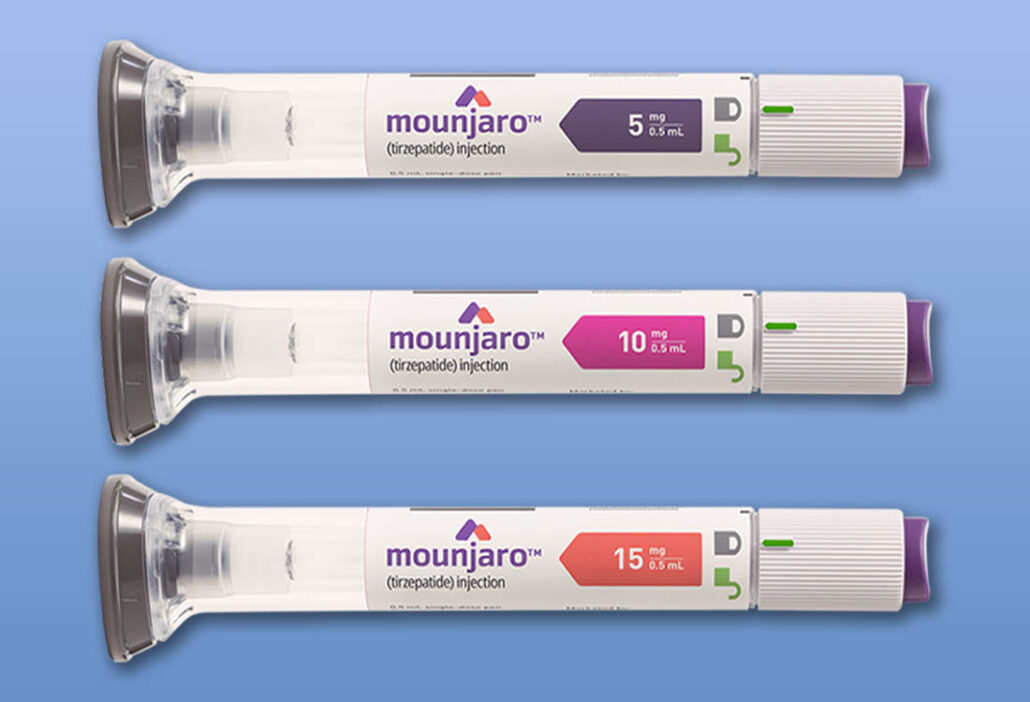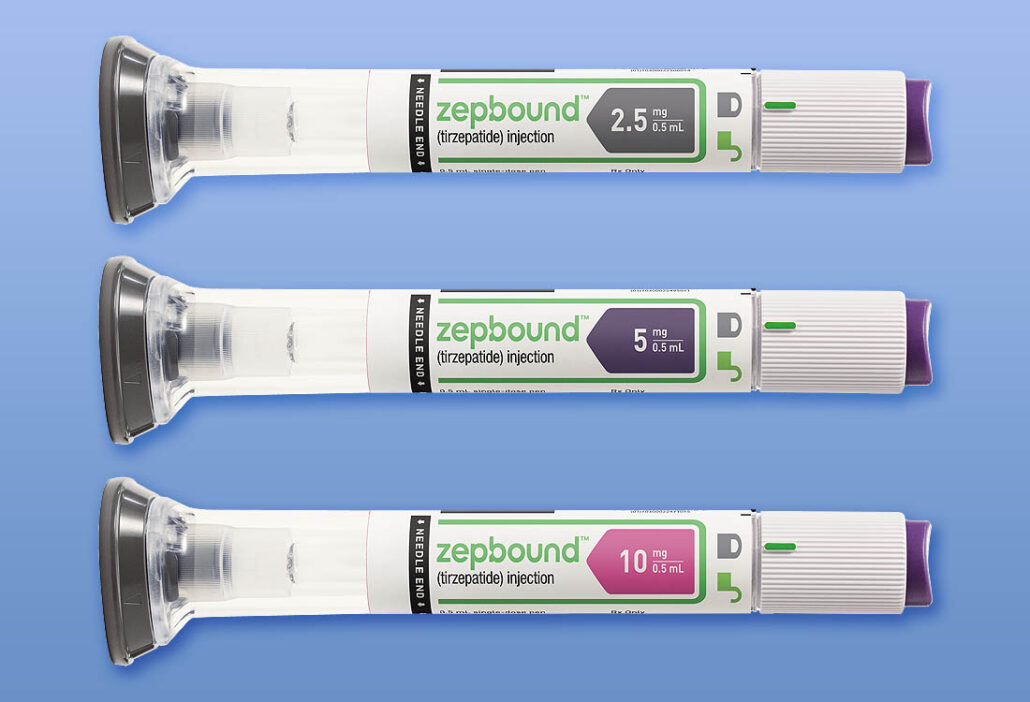
- Ozempic and Mounjaro are injectable type 2 diabetes medications that help control blood sugars and promote weight loss.
- Ozempic mimics a hormone in the body called GLP-1 RA, and Mounjaro mimics the GLP-1 RA and the GIP hormones. These hormones are released by your stomach after eating to stimulate insulin secretion, reduce glucose production in the liver, and slow stomach motility.
- Ozempic and Mounjaro are diabetes medications that help improve glucose control and aid in weight loss. Both medications are extremely effective, but Mounjaro’s dual mechanism may offer stronger effects on blood sugar and weight reduction.
- Both semaglutide (the main ingredient in Ozempic) and tirzepatide (the main ingredient in Mounjaro) are being studied for several additional health benefits.
Reading Time: 6 minutes
Ozempic made a splashy debut in 2017 with a catchy jingle and celebrity following, and Mounjaro came onto the scene five years later as another impressive type 2 diabetes medication that delivers impactful glucose management results along with significant weight loss.
How are these two game-changing medications alike? How are they different? How do you know which one would be right for you?
We’ve received lots of questions on Mounjaro vs Ozempic, so let’s get into it!
What Is Ozempic?
Ozempic (generic name semaglutide), is an injectable medication with the primary indication of helping adults with type 2 diabetes improve blood sugar control.
It’s part of a class of medications called GLP-1 receptor agonists (RA) that have been around since 2005. Ozempic is a once-a-week injection with multiple dosing strengths (0.25 mg, 0.5 mg, 1.0 mg, 2.0 mg, and 2.4 mg). The oral form of Ozempic is called Rybelsus, which is taken once daily.


How Does Ozempic Work?
🌟 Ozempic (and other GLP-1 RA medications) work by mimicking the action of a naturally occurring hormone in the body called glucagon-like peptide-1.
🌟 GLP-1s stimulate insulin secretion, reduce glucose production in the liver, and slow stomach motility to help regulate blood sugar levels after and in between meals. This can help you to feel full longer and keep your blood sugars from spiking after meals.
🌟 GLP-1s also communicate with your brain to make you feel less hungry and feel fuller faster.
What Is Mounjaro?

Mounjaro (generic name tirzepatide) is what’s called a dual-agonist medication. This means it mimics two hormones that are released after eating, offering additional benefits.
The primary Mounjaro indication is to improve glucose control in adults with type 2 diabetes. It’s also a once-a-week injection and comes in several strengths (2.5 mg, 5 mg, 7.5 mg, 10 mg, 12.5 mg, or 15.0 mg).
How Does Mounjaro Work?
Mounjaro targets two hormones to help with blood sugar control and metabolism – GLP-1 RA and GIP (glucose-dependent insulinotropic polypeptide). Mounjaro has all of the working benefits of GLP-1 as mentioned above, plus the addition of GIP which is responsible for the majority of insulin stimulation by the pancreas.
Mounjaro vs Ozempic: What’s the Difference?
The main difference between Ozempic and Mounjaro is how each medication works in the body. Ozempic mimics the GLP-1 hormone, while Mounjaro targets both GLP-1 and GIP receptors. Scientists and researchers are currently doing studies to further understand the differences.
What Do GLP-1 RAs and GIPs Do?
GLP-1 Receptor Agonists (e.g., semaglutide, liraglutide)
- Increase insulin secretion in response to food
- Reduce glucagon release (which lowers blood sugar)
- Slows gastric emptying (which helps with post-meal glucose excursions)
- Reduces appetite and induces satiety which leads to weight loss
GLP-1/GIP Receptor Agonists (e.g., tirzepatide)
- GLP-1 effects (same as above)
- GIP effect: further enhances insulin secretion
Both medications help with blood sugar control and weight loss, but Mounjaro’s dual mechanism may offer stronger effects on insulin secretion, which improves A1c levels.
Can You Use Ozempic for Weight Loss?

Semaglutide (the main component in Ozempic) is approved for the treatment of obesity, however, when used for weight control the company that makes it (Novo Nordisk) calls it Wegovy.
Wegovy is the exact same medication as Ozempic but offered at a higher dose.
Wegovy is approved for use in people with a BMI of 30 or higher, or a BMI of 27 or higher with at least one weight-related medical condition.
Can You Use Mounjaro for Weight Loss?

Tirzepatide (the main component in Mounjaro) is approved for the treatment of obesity, however, when used for weight control the company that makes it (Lilly) calls it Zepbound.
Zepbound is the exact same medication as Mounjaro.
Zepbound is approved for use in people with a BMI of 30 or higher, or a BMI of 27 or higher with at least one weight-related medical condition.
Is One More Effective for Type 2 Diabetes Management?
In looking at clinical trial results, Mounjaro for type 2 diabetes had a greater effect on A1c and weight loss than Ozempic.
In study participants, the baseline A1c was 8.3% for both groups, and the baseline weight was 206 lbs. Results showed that A1c dropped 2.3% with Mounjaro and 1.9% with Ozempic. The percentage of people who achieved an A1c less than 7% was 79% on Mounjaro and 64% on Ozempic. With Mounjaro, study participants lost 25 lbs, and 13 lbs with Ozempic.
It’s important to note that people on Mounjaro were on the maximum dose of 15 mg once a week, and people on Ozempic were on 1 mg once a week, which is less than half the maximum dose of 2.4 mg. So not exactly the same playing field.
Clinical trials are very regimented, and diabetes management in real life can look quite different. Though Mounjaro showed a greater effect on A1c and weight loss in the studies, both diabetes medications are extremely effective.

Benefits Beyond Sugar Management and Weight Loss
Current Indications for Semaglutide:
- Glucose control in adults with type 2 diabetes
- Reduced risk of major adverse cardiovascular events in adults with type 2 diabetes and established cardiovascular disease
- Obesity in adults
- Reduced risk of kidney decline, end-stage kidney disease, and cardiovascular death in adults with type 2 diabetes and chronic kidney disease
Additional Semaglutide Studies:
- Reducing fatty liver disease
- Use in adults and pediatric patients aged 12 years and older with obesity
- Reducing the risk of major adverse cardiovascular events in adults with established cardiovascular disease and either obesity or overweight
- Semaglutide oral tablets for type 2 diabetes
Current Indications for Tirzepatide:
- Glucose control in adults with type 2 diabetes
- Obesity in adults, or overweight adults with at least one weight-related comorbidity
- Moderate to severe obstructive sleep apnea in adults with obesity
Additional Tirzepatide Studies:
- Reducing fatty liver disease
- Improving osteoarthritis in the knees
- Use in adolescents with obesity or overweight with weight-related comorbidities
- Use in people with overweight or obesity and chronic kidney disease with or without type 2 diabetes
Both semaglutide (Ozempic/Wegovy) and tirzepatide (Mounjaro/Zepbound) are being studied for additional health benefits beyond blood sugar management and weight loss.
Since Ozempic was FDA-approved in 2017 and Mounjaro was FDA-approved in 2022, Ozempic has had a head start studying additional indications, but both medications are poised to offer multiple benefits.
Interesting to note is that a three-year study found tirzepatide reduced the risk of developing type 2 diabetes by 94% in adults with pre-diabetes and obesity. Another study found that withdrawing tirzepatide led to the substantial regaining of lost weight.
Can You Switch from Ozempic to Mounjaro or Vice Versa?
It is possible to switch from one of these type 2 diabetes medications to the other, but only under the supervision of your doctor.
Although Ozempic and Mounjaro are similar in many ways, they do work slightly differently in the body and come in different dosage strengths. Your doctor will need to develop a safe and effective transition plan for you.
Can You Take Ozempic or Mounjaro If You Have Type 1 Diabetes?
GLP-1s are not FDA-approved for use in type 1 diabetes in the U.S., however, some doctors do prescribe them off-label for patients who are overweight and struggle to achieve glycemic goals with insulin alone.
People with type 1 diabetes can get Wegovy and Zepbound for obesity, but not for glucose control. A prior authorization for obesity will be needed.
Ozempic and Mounjaro for Type 1 Diabetes: Why Aren't They Approved?
Some small studies have shown promising results in the type 1 diabetes population, especially in those who are overweight and have insulin resistance. However, researchers emphasize the need for larger trials.
According to Dr. Edelman, “There are over 6,000 people diagnosed with type 2 diabetes every day, compared to 175 per day diagnosed with type 1 diabetes. This may explain why type 1s are not a priority for these large companies.”
How Do You Know If Ozempic or Mounjaro Is Right for You?
Ozempic and Mounjaro are both great options for managing type 2 diabetes and supporting weight loss, but the right choice depends on your needs.
Ozempic has the cardiovascular indication and it addresses those with chronic kidney disease. If you have obstructive sleep apnea, Mounjaro may be the better choice for you. Both of these medications are being studied in many other clinical situations, as discussed above.
Insurance coverage, side effects, and personal health goals should all play a role in your decision. Work with your doctor to determine the best diabetes medication for you based on your health history and individual needs.
Mounjaro vs Ozempic: Key Takeaways
Diabetes medications like Ozempic and Mounjaro are transforming diabetes management by improving blood sugar control and promoting weight loss, and we may only be scratching the surface of what these multitasking therapies can do.
Read personal success stories of Ozempic and Mounjaro on our blog, and explore our video vault for additional resources and tips on living well with diabetes.
Additional Resources:
- Ozempic: What Is It and How to Use It
- Can Medications Like Ozempic and Mounjaro Reduce Belly Fat?
- Weight Loss with GLP-1 RAs: The Battle of the Bulge
- Practical Tips for Weight Management
- Say “Buongiorno” to Mounjaro, a New Blockbuster Diabetes Medication
- New Blockbuster Type 2 Medication Mounjaro Gets FDA Approval
- Why Mounjaro Is My New Miracle Drug
- Obesity and Diabetes: Addressing the Biggest Challenge in Type 2 Diabetes
- Gain Nutrition Know-How to Successfully Take a Newer Injectable Type 2 Diabetes Medication


Have you seen benefits of T1 taking Ozempic or Mounjaro as well as T2’s for blood sugar control and not specifically for weight loss?
Good timing for that question as I just put a patient with type 1 who was not overweight on Mounjaro to improve postprandial blood sugar control. It was amazingly helpful and her insulin requirements were cut in half! Getting it approved for use in type 1 does depend on your insurance too.
As a T1D for 49 years I find the Mounjaro situation for insurance coverage a political and economic farce. I was prescribed it by my Endo but the cost is astronomical so now to handle insulin resistance I take pioglitazone.
What T1D’s need to have happen is to have medically known physicians let the FDA know how it can assist under served T1D’s.
Please help…
Lilly, Novo Nordisk, and Genentech are working specifically to get their GLP-1 approved for type 1 diabetes, and competition will help lower the price. I feel your pain – hang in there.
I’m interested Retatrutide a triple agonist being developed by Lily.Do you have any information on this including when it might be ready for use since it is still in clinical trials?
Yes I am familiar with it, and it does seem to outperform Mounjaro. The phase 3 clinical trial is ongoing, so it will be at least a year from now before it would likely be approved.
Ozempic reduces how much insulin I use but it also reduces the weight gain that comes with insulin. When I halved my Ozempic prescription at one point I gained 10 pounds very quickly. So for me, that is another good reason for staying on Ozempic.
Totally. You’ve tested your own system to know that you need at least 1mg to get the effects. These drugs are lifelong drugs!
I’m a T1 and have been on semaglutide for a few years with amazing results both in glucose control and weight loss. Theoretically, do we think switching to a duel antagonist would have an additional effect (when compared to GLP1 alone) in a T1 with C-peptide of zero? It seems to reason GIP wouldn’t have an additional effect on T1 patients with no residual insulin production. Thoughts?
If you’re doing well, then no need to switch. GIP probably does other things than stimulate insulin secretion. If you are on the max dose of semaglutide and you need to lose more weight, then yes..switch.
Excellent review.
I have T1 patient and am interested in beginning these meds.
I practice (FM) in NJ and was wondering if you knew an end who I can refer this patient to.
Hi Jill,
Dr. Edelman is at ATTD this week, but I will check with him when he gets back and let you know.
I really don’t know a specific endo and their prescribing practices, but I do think that most endos would help if the person fits the BMI criteria.
I am T2 and was on Ozempic for 6 months with amazing results. My a1c went down and I also lost 30 pounds. Sadly, my insurance said that they would no longer cover Ozempic, so my doctor switched me to Mounjaro. My a1c remained lower, but my weight fluxuated and I ended up gaining weight. Why did this happen? I’m currently off both medications. My weight is stabalized, but I can’t lose more and my a1c is up.
There is absolutely no reason that Mounjaro did not work. Did you get the real stuff (not compounded) and did you go up to 15 mg per week?
After a month of Mounjaro 2.5 I switched up to the 5mg. I have lost weight but have had bad stomach side effects from the beginning. Do you have any recommendations to help ease the side effects. It’s awful but I don’t want to give up yet if possible.
I’m on ozempic. After 2 days of my shot I have diarrhea. What can I do?
You could definitely start at a much lower dose. You don’t have to start at .25, which is typically 40 clicks (you will have to test the number of clicks with your own pen). You can put it on 0 and count the clicks up to the .25 dose. Then you can dial the pen backwards and just take 1/4 of that. Take a very small dose and take your time. Let your GI tract get used to Ozempic.
Dr Edelman, great article. I’m on mounjaro and love it. Had no side effects for the first month. At Easter I received a box of see candies and yes, I ended up eating it in 2 1/2 days. I damn near died fron diaherea and vomiting, headache etc. I wish these companies would mention what eating sugar will happen. I was seriously ill. Better yet please publicize what cannot be eaten when taking these drugs. Thanks.
Not sure what happened to you, but there are no food restrictions with GLP1s and your story is unique to Mounjaro users. Maybe you got food poisoning from something else you ate on Easter?